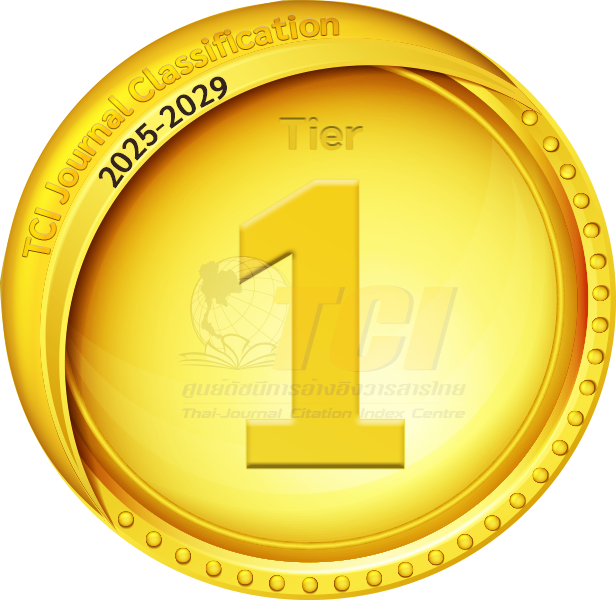Efficacy of focused teaching on chest radiographs: Comparison among novice clinicians outside the radiologic field
DOI:
https://doi.org/10.46475/asean-jr.v26i1.913Keywords:
Chest radiographs, Clinicians, Hidden areas, Medical studentsAbstract
Purpose
This study aimed to evaluate the effectiveness of focused teaching in chest radiography for different elective radiology novice doctors.
Methods
A 30-chest x-ray image test was administered to various novice doctors before and after a focused teaching session on the hidden areas of chest radiography. Novice doctors who pursued a radiology elective course in our institution were enrolled. The effectiveness of teaching was evaluated by the difference between a pretest and posttest scores. The competency among different groups of novice doctors was compared using improvement score.
Results
A total of 22 novice doctors participated, including 1 extern, 5 emergency physician residents, 10 internist residents, 2 Thai-graduated interns, and 4 foreign-graduated interns (F-INT). There was no significant difference in pretest score across student specialties. However, there was a significant difference in the score for participants before and after X-ray teaching (p < 0.001). Using the differences in pretest and posttest scores as an indicator of improvement, the improvement score differed significantly across the specialties (p = 0.04). Most of the groups showed positive improvement, except for the F-INT group which exhibited negative improvement.
Conclusions
Focusing on teaching in chest radiography has a positive significant impact on almost all novice doctors except the F-INT group. Different learners have different abilities to learn. Targeted teaching for specific learners would be more effective.
Keywords radiology education, medical student, undergraduate, postgraduate, chest x-ray
Downloads
Metrics
References
Mallio CA, Quattrocchi CC, Beomonte Zobel B, Parizel PM. Artificial intelligence, chest radiographs, and radiology trainees: a powerful combination to enhance the future of radiologists? Quant Imaging Med Surg. 2021; 11: 2204–7. DOI: https://doi.org/10.21037/qims-20-1306
Kim J, Kim KH. Role of chest radiographs in early lung cancer detection. Transl Lung Cancer Res. 2020; 9: 522–31. DOI: https://doi.org/10.21037/tlcr.2020.04.02
Donald JJ, Barnard SA. Common patterns in 558 diagnostic radiology errors. J Med Imaging Radiat Oncol. 2012; 56: 173–8. DOI: https://doi.org/10.1111/j.1754-9485.2012.02348.x
Bradley SH, Abraham S, Callister ME, Grice A, Hamilton WT, Lopez RR, et al. Sensitivity of chest X-ray for detecting lung cancer in people presenting with symptoms: a systematic review. Br J Gen Pract. 2019; 69: e827–e835. DOI: https://doi.org/10.3399/bjgp19X706853
Petinaux B, Bhat R, Boniface K, Aristizabal J. Accuracy of radiographic readings in the emergency department. Am J Emerg Med. 2011; 29: 18–25. DOI: https://doi.org/10.1016/j.ajem.2009.07.011
Jimah BB, Baffour Appiah A, Sarkodie BD, Anim D. Competency in Chest Radiography Interpretation by Junior Doctors and Final Year Medical Students at a Teaching Hospital. Radiol Res Pract. 2020; 2020: 8861206. DOI: https://doi.org/10.1155/2020/8861206
Wu JT, Wong KCL, Gur Y, Ansari N, Karargyris A, Sharma A, et al. Comparison of Chest Radiograph Interpretations by Artificial Intelligence Algorithm vs Radiology Residents. JAMA Netw Open. 2020; 3: e2022779. DOI: https://doi.org/10.1001/jamanetworkopen.2020.22779
Limchareon S, Kongprompsuk S. The value of medical student radiology education: A comparison of 1-week, 2-week, electives, and compulsories. J Chin Med Assoc JCMA. 2018; 81: 548–51. DOI: https://doi.org/10.1016/j.jcma.2017.09.010
How Learning Works by Susan A. Ambrose | Perlego [Internet]. [cited 2023 Jan 10]. Available from: https://www.perlego.com/book/1008816/how-learning-works-seven-researchbased-principles-for-smart-teaching-pdf
Alexander K, Bélisle M, Dallaire S, Fernandez N, Doucet M. Diagnostic imaging learning resources evaluated by students and recent graduates. J Vet Med Educ. 2013; 40: 252-63. DOI: https://doi.org/10.3138/jvme.1212-112R1
Nabhani Y, Xie VK, Badawy M, Karim R, Abdullatif U, Negm AS, et al. Multidisciplinary approach of teaching radiology to medical students in Egypt: Is this an effective method? Egypt J Radiol Nucl Med. 2021; 52: 292. DOI: https://doi.org/10.1186/s43055-021-00672-1
Wu Y, Theoret C, Burbridge BE. Flipping the Passive Radiology Elective by Including Active Learning. Can Assoc Radiol J. 2021; 72: 621–7. DOI: https://doi.org/10.1177/0846537120953909
Isaacs AN, Spencer BA. Factors affecting learning during internship: A qualitative study of junior doctors. Aust J Gen Pract. 2022; 51: 83–9. DOI: https://doi.org/10.31128/AJGP-02-21-5821
Straus CM, Webb EM, Kondo KL, Phillips AW, Naeger DM, Carrico CW, et al. Medical student radiology education: summary and recommendations from a national survey of medical school and radiology department leadership. J Am Coll Radiol JACR. 2014; 11: 606–10. DOI: https://doi.org/10.1016/j.jacr.2014.01.012
Gopnik A, Griffiths TL, Lucas CG. When Younger Learners Can Be Better (or at Least More Open-Minded) Than Older Ones. Curr Dir Psychol Sci. 2015; 24: 87–92. DOI: https://doi.org/10.1177/0963721414556653
Pérez EV, Santos LMR, Pérez MJV, de Castro Fernández JP, Martín RG. Automatic classification of question difficulty level: Teachers’ estimation vs. students’ perception. In: 2012 Frontiers in Education Conference Proceedings. 2012. p. 1–5. DOI: https://doi.org/10.1109/FIE.2012.6462398
Cooperstein LA, Good BC, Eelkema EA, Sumkin JH, Tabor EK, Sidorovich K, et al. The effect of clinical history on chest radiograph interpretations in a PACS environment. Invest Radiol. 1990; 25: 670–4. DOI: https://doi.org/10.1097/00004424-199006000-00009

Downloads
Published
How to Cite
Issue
Section
License
Copyright (c) 2025 The ASEAN Journal of Radiology

This work is licensed under a Creative Commons Attribution-NonCommercial-NoDerivatives 4.0 International License.
Disclosure Forms and Copyright Agreements
All authors listed on the manuscript must complete both the electronic copyright agreement. (in the case of acceptance)
















